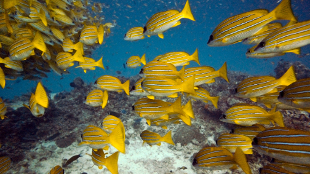 FLICKR, MALCOLM BROWNE
FLICKR, MALCOLM BROWNE
As ocean temperatures rise over the next century, fish will migrate to cooler latitudes, according to projections by fisheries scientists at the University of British Columbia (UBC). As a result, many regions of the tropics could become “hotspots” for local fish extinctions, which could in turn threaten ecosystems and human livelihoods. The results, based on climate scenarios issued by the Intergovernmental Panel on Climate Change (IPCC), were reported today (October 10) in the ICES Journal of Marine Science.
To generate the predictions, UBC researchers Miranda Jones and William Cheung modeled the effects of best- and worst-case ocean warming scenarios on the global distributions of 802 species of fish and marine invertebrates. In the best-case scenario—an increase of 1oC by 2100—species would be expected to migrate ...




















